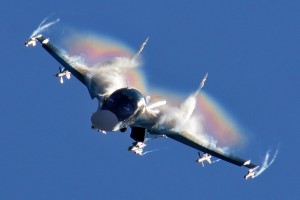Russia’s Anti-Terrorist Campaign in Syria. Moscow’s Broader National Security Interests

Russia’s anti-terrorist campaign began with a bang on September 30th. ISIS and al-Nusra positions were hammered by Russian fighters in northeast and northwestern Syria, respectively.
Within days, reports came in confirming many rebel terrorists had fled Syria into Iraq, and many more had abandoned the field altogether by escaping south into Jordan. Having secured a buffer zone around Latakia, Su-30 and Su-34 bombing runs are still ongoing at a brisk pace in northern Syria. The Kurdish YPG is eager to work with Russian forces and provide coordinates of ISIS strongholds. Targets in Raqqa have already been hit by Russian jets. Further, elite Iranian IRGC troops have publicly committed to help with ground units, most likely with Shiite militias from Iraq, Afghanistan, and Lebanese Hezbollah. The US has scaled back operations to avoid any confrontations, but is still operating clandestinely in Syria, with commando raids and arms airdrops.
One month in from the start of Russian intervention, world leaders are still recovering from the aftershock. The Russian Federation has willingly stepped in as the guarantor of security in Syria. Rumors are already floating over future Russian airstrikes in Iraq, and how soon allied ground forces can retake key nodes from ISIS control. What is clear is this: Russia has special interests in Syria and the Middle East which it simply cannot ignore, look away from, or turn its back on. Specifically, Russia worries about the spread of ISIS into the Caucasus region and Central Asian states. This is Russia’s “soft underbelly” that Western geo-analysts had often discussed during the Cold War.
The Russian provinces of Dagestan, Chechnya, and Ingushetia suffer from a Caucasian emirate loyal to ISIS and are responsible for numerous terror bombings, high poverty, and Islamist firebrand mullahs who radicalize vulnerable youths, and the disaffected and deranged. Abroad, ISIS has set up camps in northern Afghanistan and threatens to infiltrate Tajikistan, where Islamists and former military have already begun attacks and where Russian troops offer key support. In Ankara, Turkey, President Erdogan, in his unholy alliance with the Gulf monarchies, now has brought death back to his own country, with the Oct. 10th bomb blasts tied to ISIS killing over 100 innocents.
In the US, Obama has continued to parrot his “no combat troops in Syria” line, even as Secretary of Defense Ashton Carter publicly refuses to rule out the use of troops. Clearly, this disconnect reveals the growing polarization between US policy elites. Even the buffoonish Republican candidate Donald Trump approves of Russia’s intervention and Obama’s new hands-off policy in Syria, while the rest of the war-hawk Republicans and Hillary Clinton are eager to denounce Russia and escalate the conflict. Violence and conflict is all they know of politics, just as they were willing to engage in the atrocious interventions in Iraq, Afghanistan, and Libya, three countries still embroiled in civil war and anarchy.
Expect Russia and Putin to gain more respect and international clout as Federation airstrikes continue to pound Islamist terrorists to dust in Syria. If NATO ever finally accepts the mendacities and duplicity of its Gulf monarchy allies, it can begin to further disentangle itself from the region, which the world would greet with welcome relief. Syria has a violent and fractious history as a nation, and Russia certainly has built up intelligence assets from the Soviet-era alliance with Damascus. The US and the West must be satisfied as junior partners in any future coalition, as it is Moscow’s combination of a shared culture of fighting Islamism, deep intelligence work, and warrior ethos that is winning in Syria, not NATO’s half-hearted coalition with Gulf nations, or its self-proclaimed military and economic supremacy.
By acting on invitation from al-Assad’s government, Russia has intervened (however cynically it may be viewed in the West) within the framework of international law. By fighting terror at its root source, the Russian government has usurped the role of providing security in the Mideast from the US. This is a direct challenge to US imperium, of assuming the mantle of global security, so we shouldn’t expect Washington to go quietly anytime soon.
The US-Turkish-Saudi-Gulf alliance, by funneling arms to the Syrian “moderate resistance” and escalating what is now a four-year long civil war, has proven it is willing to team up with barbaric jihadists in order to achieve its imperial ambitions, further the Gulf States’ Sunni oil/gas pipeline political agenda, take out Assad, and stymie Iranian and Russian power in the region. As to whom the rogue states are, the ones contravening international agreements and supplying terrorists with weapons, it is plain for the world to see.
William Hawes is a writer specializing in politics and environmental issues. You can reach him at [email protected].

